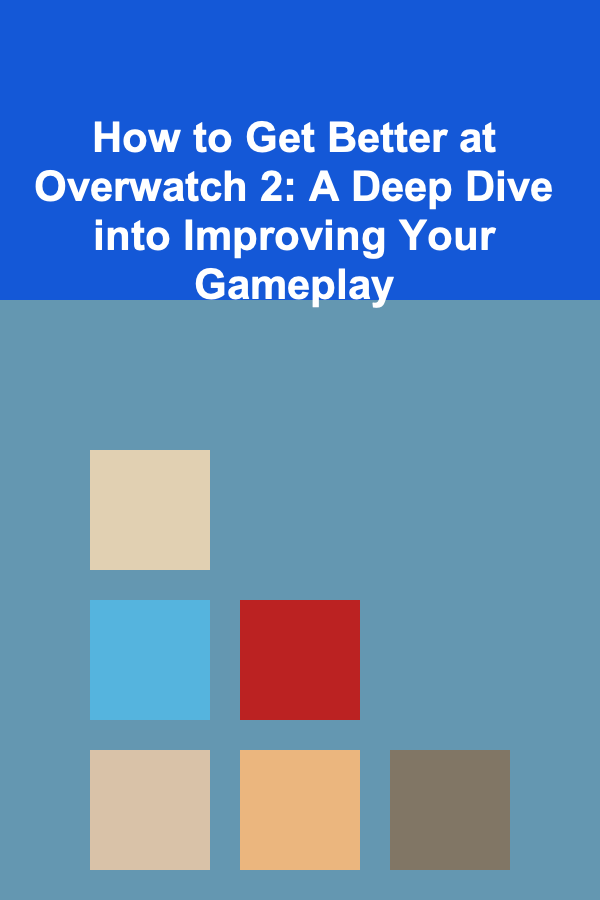
How to Get Better at Overwatch 2: A Deep Dive into Improving Your Gameplay
ebook include PDF & Audio bundle (Micro Guide)
$12.99$8.99
Limited Time Offer! Order within the next:

Overwatch 2 is a fast-paced, team-based first-person shooter (FPS) that has captivated millions of players worldwide. With its colorful characters, diverse abilities, and strategic gameplay, it has established itself as one of the most popular competitive games. However, for those looking to improve their skills, Overwatch 2 can be an overwhelming experience. Whether you're a newcomer to the franchise or an experienced player trying to reach the next level, there are specific strategies, mindsets, and techniques that can help you become better at the game.
In this article, we will explore practical tips, in-depth strategies, and the mindset required to excel in Overwatch 2. From mastering hero abilities to improving teamwork and communication, this guide will provide the tools you need to take your gameplay to new heights.
Understanding the Game's Core Mechanics
Heroes and Their Abilities
One of the first steps to getting better at Overwatch 2 is understanding the game's core mechanics. Unlike traditional FPS games, Overwatch 2 is centered around diverse heroes, each with unique abilities that can change the tide of battle. Heroes are divided into three main roles: Damage, Tank, and Support. Each role plays a crucial part in the team dynamic, and understanding how to play each role effectively is fundamental to improving your overall gameplay.
Damage Heroes are designed to deal damage and eliminate opponents. They are the ones who often secure eliminations and push the team's offensive efforts. Tank Heroes have high health pools and are tasked with absorbing damage for the team, providing protection, and creating space. Support Heroes focus on healing and providing utility to their team, ensuring that damage dealers stay alive and tanks remain functional.
To get better, you must not only know your main hero's abilities but also how to synergize with your teammates' abilities. Understanding the intricate relationship between heroes will help you adapt quickly in any situation.
Map Knowledge
Overwatch 2 has a variety of maps, each with unique layouts, objectives, and terrain. Map knowledge is essential for knowing where to position yourself, how to approach objectives, and when to make the most out of your hero's abilities.
For example, in maps with high ground, certain heroes (like Widowmaker or Hanzo) can take advantage of their long-range abilities. In contrast, maps with tight corridors and choke points might be better for heroes like Reaper or Junkrat, who can maximize their area-of-effect damage.
By learning the maps and their intricacies, you'll be able to make better decisions during every match, whether it's positioning yourself for a fight, coordinating with teammates, or controlling objectives.
Mastering Your Hero Pool
Choosing Your Main Hero
While it might be tempting to switch between multiple heroes, mastering a small set of heroes is often more effective. By focusing on a specific hero or a small group of heroes, you can gain a deeper understanding of their strengths, weaknesses, and optimal playstyles. It allows you to hone your skills and become more consistent in your performance.
Each hero has a different skill ceiling, and some may be easier to learn than others. For example, heroes like Soldier: 76 or Bastion are relatively beginner-friendly because they are straightforward to play. However, more complex heroes like Genji or Zenyatta require precise mechanical skill, game sense, and timing to be effective.
Pick a hero that suits your playstyle and stick with them for a while. Once you feel comfortable with your main hero, you can expand your hero pool, but keep refining your abilities with your core picks.
Learning Advanced Mechanics
Each hero in Overwatch 2 comes with a unique set of mechanics that requires practice to master. Whether it's learning the optimal way to use a character's ultimate, understanding how to time abilities for maximum effectiveness, or mastering movement mechanics, diving deep into the nuances of your hero is key to improving your gameplay.
For example:
- Reaper relies on his life-steal mechanic to sustain in fights. Knowing when to dive into the fray and when to back off is crucial.
- Tracer requires excellent movement to dodge incoming damage while dealing constant pressure on the enemy team.
- Winston uses mobility to jump into the backline and disrupt squishy targets. Mastering his jump and positioning can make all the difference.
Spend time in the training room practicing these abilities, learning the ins and outs of how to use them efficiently.
Improving Your Game Sense
Strategic Positioning
Positioning is one of the most important aspects of improving at Overwatch 2. Bad positioning can lead to unnecessary deaths, while good positioning can result in better damage output, survivability, and utility. Being aware of where the fight is happening, where your teammates are, and where the enemies are likely to come from can give you an edge in almost every encounter.
Some general tips for improving your positioning:
- Stay close to your supports. It's vital to have healers nearby to sustain you in fights. They will be less likely to heal you if you are too far from them.
- Use high ground when possible. High ground provides better visibility and allows for safer engagements, especially for damage dealers like Widowmaker and Hanzo.
- Don't overextend. Pushing too far ahead can leave you isolated and at risk of being ambushed. Make sure you have escape routes and are aware of enemy positions.
Situational Awareness
Being aware of the flow of the game is critical. This includes understanding the objective at hand, what the enemy team is doing, and what your team's strategy is. Always be thinking about the next step: should you be pushing for an objective, holding a defensive position, or rotating to a new location?
In addition to this, be aware of the ultimate abilities of both your teammates and enemies. A well-timed ult can turn the tide of a battle, but using them recklessly or when they aren't needed can waste a crucial opportunity.
Communication and Teamwork
Communicating with Your Team
Overwatch 2 is a team game, and communication is key to success. Using voice chat or in-game communication wheels can significantly impact the outcome of a match. Calling out enemy positions, ultimates, or objectives can help your team respond more effectively.
- Call out enemy ultimates: If you know that an enemy is about to use their ultimate ability (like Zarya's Graviton Surge or Reaper's Death Blossom), alerting your team can allow them to prepare or counter it.
- Coordinate with your tank: Tanks are the backbone of any team. Let them know if you're ready to push or if you need help to break through a choke point.
- Support and healing coordination: Let your healers know if you're in danger or need healing. On the flip side, support players should also communicate when they have their ultimate ready to help protect or buff teammates.
Learning to Be a Team Player
While Overwatch 2 rewards individual performance, it's a team-based game, and cooperation is often the deciding factor in winning. Understand when to prioritize team objectives over personal goals. For example, if your ultimate ability can help the team win a fight but you're about to die, it's better to save it for the next fight rather than use it selfishly.
Be flexible with your hero picks, especially when your team composition needs change. It might be tempting to stick with your favorite hero, but being adaptable and switching to a hero that fits the team's needs can help ensure victory.
Analyzing Your Mistakes and Improving
Reviewing Your Replays
One of the best ways to improve at Overwatch 2 is to review your replays. Overwatch provides detailed replay systems that allow you to watch your gameplay from different perspectives. This helps you see where you made mistakes, where you could have played better, and what you can do differently in future matches.
Look for areas where you might have over-extended, made poor positioning choices, or failed to communicate with your team. Replays are a valuable tool for identifying bad habits and learning how to avoid them in the future.
Setting Goals and Tracking Progress
Set specific goals for yourself and track your progress. This could be as simple as improving your accuracy, learning to use a new hero, or improving your game sense by winning more team fights. Break these goals down into actionable steps and focus on one thing at a time.
Remember that improvement takes time. Don't get discouraged by setbacks or losses. Instead, use them as learning experiences to get better.
Mentality and Mindset
Staying Calm Under Pressure
One of the most challenging aspects of Overwatch 2 is staying calm during high-pressure situations. Whether it's a team wipe, a lost fight, or a tough match, staying positive and focused is essential.
- Take breaks when necessary. If you feel frustrated or stressed, take a short break to clear your mind. It will help you come back refreshed and more focused.
- Keep a growth mindset. Understand that every match is an opportunity to learn. Even losses can teach valuable lessons if you analyze what went wrong and how you can improve.
- Don't tilt. If you find yourself getting upset, it's important to take a step back and focus on improving your gameplay rather than getting caught up in negative emotions.
Learning from Others
Finally, learning from others---whether it's watching high-level streamers, participating in discussions, or getting feedback from your teammates---can offer valuable insights. Watch how professional players position themselves, when they use their abilities, and how they approach different situations. Absorb what works for them and adapt it to your own playstyle.
Conclusion
Getting better at Overwatch 2 requires a combination of technical skill, strategic thinking, teamwork, and mental fortitude. By mastering your heroes, understanding maps, improving communication, and maintaining a positive mindset, you can climb the ranks and become a more effective player. It takes time and effort, but with dedication and the right approach, you'll be well on your way to dominating in Overwatch 2.

How to Build a Checklist for Structuring Your Business Presentation
Read More
How to Create a Welcoming Environment for New Tenants
Read More
How to Create a Well-Lit Reading Nook in Your Home
Read More
How to Use Compound Interest to Your Advantage in Investments
Read More
How to Research Blockchain Regulation and Compliance
Read More
Health and Wellness Feng Shui: Boosting Vitality
Read MoreOther Products

How to Build a Checklist for Structuring Your Business Presentation
Read More
How to Create a Welcoming Environment for New Tenants
Read More
How to Create a Well-Lit Reading Nook in Your Home
Read More
How to Use Compound Interest to Your Advantage in Investments
Read More
How to Research Blockchain Regulation and Compliance
Read More